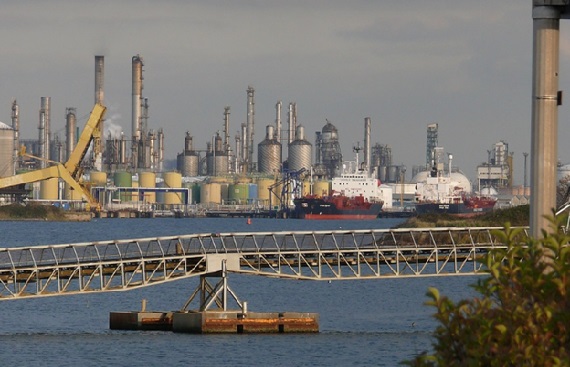Oil trading basics and how it works

Introduction
Do you truly comprehend what is happening? Users might have noticed news regarding the rising or falling oil price. If not, relax; you are not alone. The crude oil prices may be difficult for even the most seasoned traders. You can start your Oil trading journey using the most recommended trading platform like Oil Profit.
1. We'll deconstruct the fundamentals of petrodollars in this article and assist you in comprehending how it functions:
2. We will begin by going over what oil production is and how it is utilized.
3. We'll discuss the various pending oil transactions that are exchanged just on an exchange, and we'll wrap up by outlining how prices are set.
After this article, you will learn more about the energy markets and what they look like when investing in crude oil.
How, Then, do Oil Trades Operate?
And this is how dealing in oil operates: imagine you're a provider in the Midwestern with a boatload of oil you'd desire to get rid of. You can present it for sale there at a specific price. Others have oil to sell besides you, however. So several vendors are out there, and they are all vying for customers. You must thus locate a buyer who will accept your pricing.
Let's pretend you are a buyer right now. When searching for oil, you discover that a barrel costs $50 at the moment. So, you issue an order with both the interchanges to acquire as much oil as possible at that cost after determining that you're prepared to spend up to $55 for each barrel. So, you've just exchanged oil after the interchange connects the two parties.
Why do oil prices fluctuate?
Probably upon your mind is what influences crude prices. Several things are involved. The first is want, determined by factors such as the economy's expansion and industrial production. The third is stockpile, influenced by factors such as OPEC output limits and political unrest in nations producing oil.
The hypothesis is the third element. Based on anticipated future price changes, dealers purchase and sell oil futures at this time. Finally, the cost of products and services is impacted by inflation, as the fourth element, which may raise oil prices. Thus, as you'll see, various variables influence oil prices. If you want to enter the energy trading industry, you comprehend this intricate structure.
What Kinds of Partnerships Are There for Oil?
Trade agreements come in a variety of forms. However, the WTI trade, short for West Texas Midland, is currently the most popular. The cost of the medium, sweet crude oil supplied at Cushing, Oklahoma, serves as the basis for this US reference.
There are, however, agreements based on various kinds of oil, such as Crude Prices, which comprises a blend of hydrocarbons from 15 distinct North Sea locations. Alternatively, you might use Middle Eastern light oil known as Dubai Crude. Additionally, some arrangements are dependent on distribution locations. For instance, you may purchase a contract for WTI that is deliverable in Europe or for Distillate Fuels supplied in the UK.
How to Purchase Derivatives on Oil
There are a few key points to bear in mind while investing in oil futures. First, starting with the fundamentals, how do oil futures work? The ability to purchase or sell a predetermined quantity of petroleum at a given price at a future point in time is provided via contracts known as oil futures. They are simply a mechanism to fix the price of oil so that you know what you are purchasing for and may be used to safeguard yourself against price changes.
You must register for a broker's account to trade oil futures. You'll be given access by the operator to the payment system that allows you to purchase agreements. Additionally, you may employ swing trades, enabling you to trade using bank loans to boost your earnings (or losses). It's vital to keep in mind that investing in oil futures is dangerous, so before you begin trading, ensure you are aware of the hazards.
What Kinds of Risks Am Associated when Selling Oil?
Let's discuss the hazards associated with trading oil. First, as you know, the market is quite erratic, and prices may fluctuate quickly depending on several variables. It's crucial to understand the hazards before participating for this reason. Just a few points to know are as follows:
- Since oil is a property, its price may fluctuate due to market conditions outside your power. Since fraud is constantly a concern, it's crucial to deal with a trustworthy organization. In addition, the price of oil may be impacted by world events, political turmoil, and sometimes even natural calamities.
Conclusion
I'm sure you're questioning how all of this operates. After all, the procedure is challenging. But we'll simplify things for you. First, light sweet crude is how oil is taken from the earth. The molecular combination that makes up crude oil requires a lot of labor to transform it into the liquid fuels we consume daily. Refineries transform crude oil into various goods like fuel oil. In addition, they create other goods, including lubricants, cement, and fuel oil. Every refinery has a different collection of industrial equipment and generates a different assortment of products.
While certain distilleries are better at producing gasoline than others, some may be better at producing biodiesel. A refinery's output is determined by the kind of petroleum products it receives, the processing equipment it possesses, and the current market circumstances. That is how oil is good for buyers. It will help you comprehend the procedure and oil purchasing in general.
Read More News :
Can digital yuan overpower the dollar in the future?
Blockchain can help the agriculture industry maintain crop quality

.jpg)

